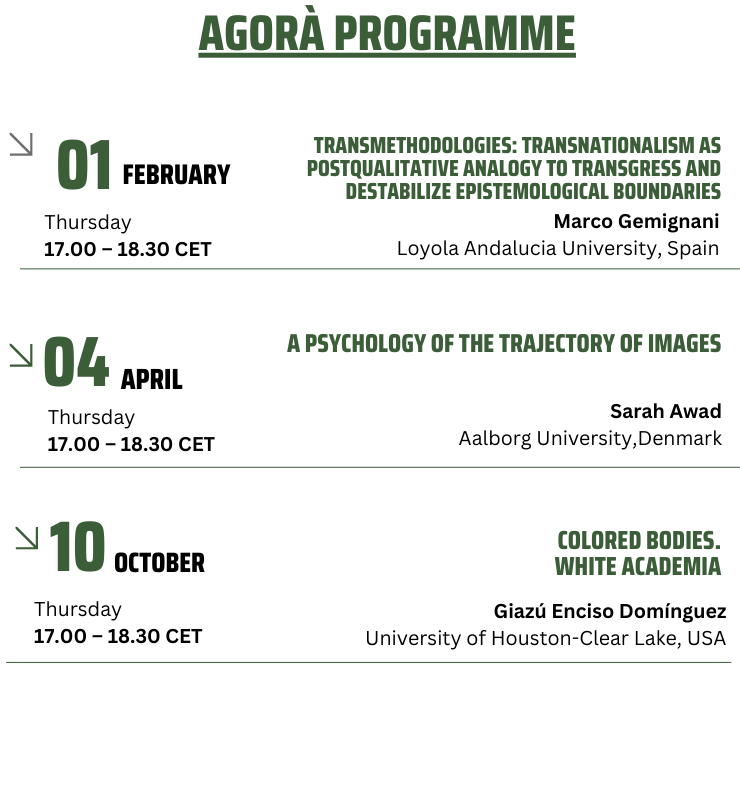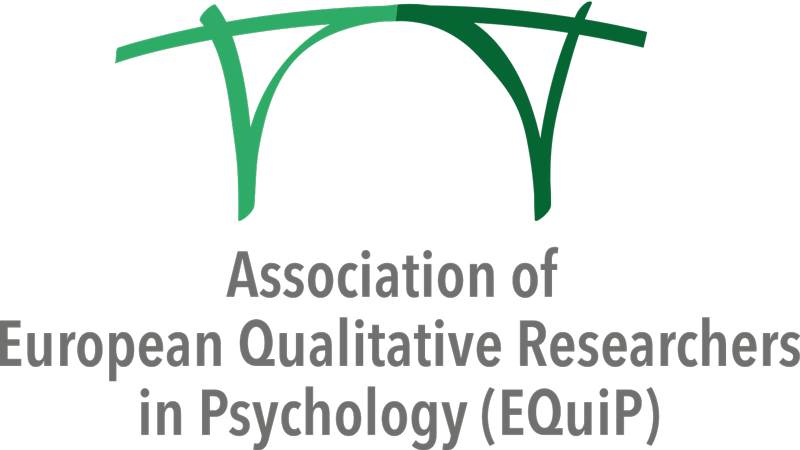E-AGORÀ
ONLINE | 01 February, 04 April, 10 october 2024
E-AGORA’ is a free open space, organized by the association of European Qualitative Researchers in Psychology (EQuiP), to support and discuss the work of qualitative researchers in psychology. In each session, one scholar will give a presentation of 45 minutes related to qualitative methods/methodologies in psychology and an open discussion with the audience will follow.

Transnational families transcend frontiers despite national boundaries and divisions. When space, time, relations, and affects are destabilized and reconstructed in transnationality, established orders (geopolitical borders), normalities (traditional vs. transnational families), and categories of space (here and there) and belonging (inside and outside of a family) can be re-envisioned. Transnationality becomes, then, a reallife analogy for post-qualitative research, which exists beyond pre-formed, Western, and potentially colonial understandings of what counts as good knowledge and good methods. Starting from this analogy, I propose the concept of transmethodologies. As epistemology, transmethodologies move the inquiry from applications of methods and theories to the relational and political becoming of phenomena (e.g., problematizations of transnational children). In both transnationalism and transmethodologies, research and knowledge are future-forming and relational, rather than linear, representative descriptions or interpretations. For instance, family communications and memories are seen as rhizomatic, futureforming processes for the creation of knowledges and realities that are in-between, with no beginning and end.
A Psychology of the Trajectory of Images
In today’s visual culture there is an unprecedented accessibility for people to use images to represent themselves and their views, and to document, broadcast, as well as manipulate world happenings. In this presentation I discuss an approach to investigating images as everyday cultural artefacts that we use to act on the world, others, and ourselves, and symbolically and materially in return, those images surrounding us shape our thoughts, emotions and memories. I present a methodological framework through which I follow the social lives of images as they enterinto societal dialogues and get transformed by different social actors who produce, view, and destroy them. Images are conceptualized as objects of study, as well as a method for studying psychological and social processes involved in social and political action as well as the production and transformation of knowledge. Using a wide variety of examples from social movements, political campaigns, and internet memes, I discuss the empirical opportunities and challenges in studying visual material.
This project analyzes academic spaces and their impact on the bodies of those who inhabit them with the aim of understanding and producing knowledge about our bodyminds. From Affect Studies, we* seek to bring into the conversation the voices of students and professors who have not been able to define or identify themselves within the academy. These bodyminds have been defined/identified by society by markers of inequalities such as raceethnicity, sexgender, sexual orientation, economic status, religion, immigration status, among others. This project is an affectivereflexive exercise were students work on creative/affective/writing (poetry, spoken word, or narratives…) Students reflect on bilingualism, biliteracy, and biculturality in academia. This work contributes to revealing epistemic injustices, avoiding the elimination of other expressions that can be emancipatory or signs of resistance, struggle, and healing. Finally, we look to develop an affective project on students in academic spaces that contributes to social justice in academia. *In this paper, as a political decision, we will use the pronoun ‘we’ to refer to the author’s work. This position assumes that knowledge is produced in a dialogical community and that, although the writing process is usually solitary, the production of ideas has not been.
The organizers of AGORÀ are Angelo Benozzo (a.benozzo@univda.it) and María del Río Carral (maria.delriocarral@unil.ch)




